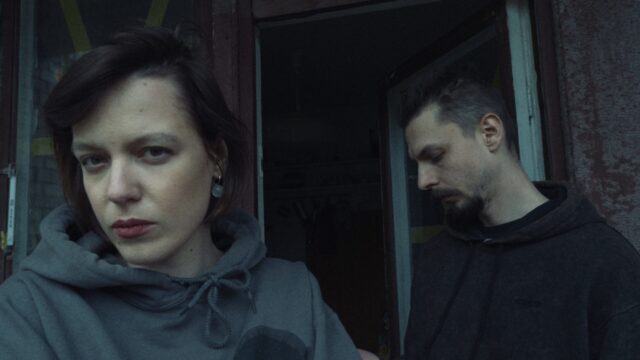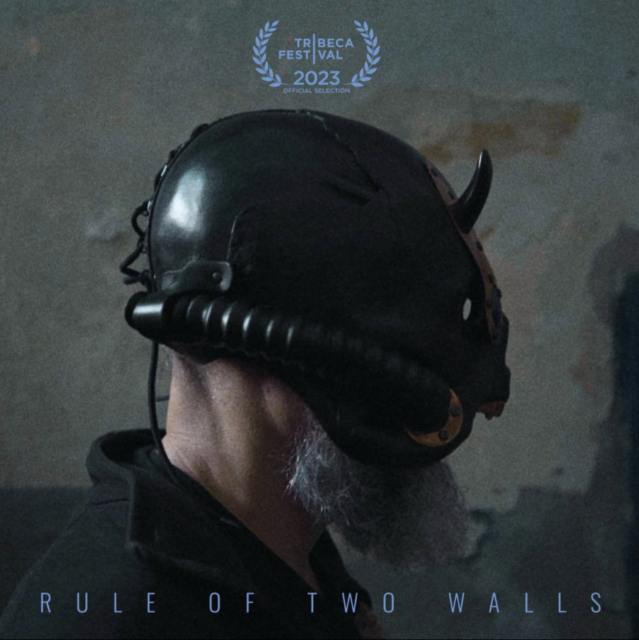
David Gutnik’s Rule of Two Walls celebrates the resilience of brave Ukrainian artists during a brutal war
RULE OF TWO WALLS (David Gutnik, 2023)
Thursday, June 8, SVA 2, 6:30
Saturday, June 10, Village East, Cinema 3, 2:45
Friday, June 16, AMC 19th St. East 6, Cinema 1, 5:15
Sunday, June 18, Village East by Angelika, 8:30
tribecafilm.com
Shortly after Russia invaded Ukraine in February 2023, the ProEnglish Theatre of Ukraine converted its black box space into a shelter for members of the theatrical profession and neighbors, began collecting food and medicine for the elderly, and continued to make art. On March 27, 2023, the Kyiv-based company teamed with Boston’s Arlekin Players Theatre to livestream a production of Harold Pinter’s The New World Order, a ten-minute play that deals with imperialism, totalitarianism, and hegemony, as a fundraiser as well as a bold statement about the resilience of the Ukrainian people and the power of art.
In April, Ukrainian American filmmaker David Gutnik went to Warsaw with his camera to interview Ukrainians who had been displaced by the war. Instead, he spent the next seven months in Ukraine, following artists who had chosen to stay. The result is the terrifying but life-affirming Rule of Two Walls, making its world premiere at the Tribeca Festival, where Gutnik screened his feature film debut, Materna, in 2020.
The film, which mixes narrative with documentary, begins with the sounds of war — guns, bombs, sirens — and a couple in bed in Lviv, just waking up, seen in shadows and silhouettes. “My gallbladder hurts,” the man, Stepan Burban, says, as if oblivious to what is happening in his country. They both laugh, and the woman, Lyana Mytsko, says, “Why would it do that? Little Stepanko, ninety-five years old.” As an air raid alarm wails outside, Lyana gets up and opens the shades, revealing windows taped with large Xs, centered by Jewish stars, to protect it from explosions. “Set some tea,” Stepan suggests. On the window, they have written in black marker, “Sad Stupid World or No?” with a drawing of the sun peeking out from behind clouds. As news reports detail attacks and deaths, Stepan walks out onto his balcony and watches men playing soccer below.
Lyana is the director of the Lviv Municipal Art Center, where artists depict the war through painting, drawing, collage, sculpture, photography, video, and installation; the exhibition they are working on is called “Shelter,” which includes the work of Diana Berg, who explains that she made her pictures of a destroyed theater “to regain some control over all this crazy shit.”

Writer, director, editor, and cinematographer (with Volodymyr Ivanov) Gutnik takes viewers through a dangerous, still-burning recently bombed area with downed electrical wires and charred bodies; a recording session where Stepan is making a new song in which he defiantly declares, “Didn’t get to love enough, to live long enough, and I’m not sorry”; a basement where men and women prepare Molotov cocktails; the studios of radical artist and “convinced materialist” Bob Basset, who poses in postapocalyptic hardcore masks, and Kinder Album, whose stylistic watercolor visions of the fighting have such titles as Russian attacks on civilian targets in Ukraine could be a war crime and Dozens of civilians were killed by metal darts from Russian artillery; a group of locals working to safeguard a tall historical monument; and artist Bohdana Davydiuk pasting political posters out on the street and explaining, “There is a war, and there is a war for truth.”
Along the way, several members of the crew share their painful personal experiences of how the war has directly impacted their families.
Named after the advice that Ukrainians should seek shelter between two walls during attacks — one to stop projectiles, the other to block shell splinters — Rule of Two Walls is a harrowing look at the bravery of Ukrainians who refuse to give up to the Russians, instead defending their home and their culture against seemingly impossible odds. With death all around them — Gutnik includes several frightening scenes of mutilated, bloody, burning bodies — a group of brave creators forges ahead, fighting the only way they know how, through their art. It’s a devastating film with a gorgeously symbolic ending.
Rule of Two Walls is screening June 8, 10, 16, and 18 in the Tribeca Festival’s Documentary Competition; the first three shows will be followed by a Q&A with Gutnik, joined on June 8 and 10 by film participants and, on June 8, by executive producer Liev Schreiber, who cofounded BlueCheck Ukraine, a nonprofit that “identifies, vets, and fast-tracks urgent financial support to Ukrainian NGOs and aid initiatives providing life-saving and other critical humanitarian work on the front lines of Russia’s war on Ukraine.” In a statement, Tony winner and Emmy nominee Schreiber said, “In David’s film, I saw the embodiment of the resilience I observed during my time in Ukraine: the profound spirit, sense of nation and history emboldened by an existential war. As an artist in my own right trying to do all that I can to help Ukraine, I responded to the film’s focus on Ukrainian artists processing the brutality of the war while using their art to fight back. This honest and intimate portrait of the first months of the war resonates deeply with me.”
Meanwhile, Arlekin Players Theatre is livestreaming The Gaaga from a converted Boston restaurant June 8-18, a site-specific phantasmagoria written and directed by Ukrainian playwright Sasha Denisova, who has been living in Poland as a refugee. “In the first days of the war, I fled from Moscow, where the police came for me. Russia bombed Kyiv and my mother, Olga Denisova, who was born under the bombing of Kyiv on July 7, 1941. She refuses to leave and awaits victory in her home. During these months, I thought about what would give hope to me and those who fled the war. A trial of Putin and his government was the biggest expectation,” Denisova said in a statement.
As Album proclaims in the film, “No war can deprive us of our cultural heritage and traditions.”